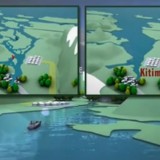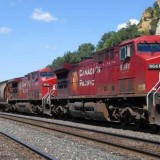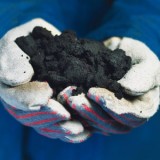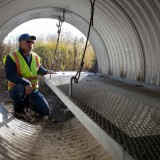The tide seems to be turning against the Enbridge Pipeline but we must take great care not to lose by winning.
Industry seems to be talking alternative routes by using rail or other methods.
My old friend Tex Enemark weighs in this morning in an op-ed in the Sun(August 15) and makes several points – we can soak the companies by levying high taxes for rights of way, we can make the pipelines safer (you will note he doesn’t say “safe”), we can use other routes, and that if we don’t permit the pipelines China will retaliate by reducing imports of our other goods.
WHAT NONE OF THESE VOICES SEEMS TO UNDERSTAND IS THAT BECAUSE THERE WILL BE SPILLS,THE DAMAGE, EVEN OF SMALL SPILLS, OF BITUMEN IS SO TOXIC THAT IT CAN NEVER BE REPAIRED AND THAT THE GUNK MUST GO TO MARKET VIA SOME OTHER METHOD.
Let me deal with the last point first – are we to announce to all trading partners, including the USA, that if you threaten our exports, you can come here and do as you please?
This is not a rhetorical question because a new government in 2013 will surely look at Private Power projects, many American owned, which could be canceled, altered or refused in the first place. Do we back off our sovereignty and say, “sorry for even thinking of this, Uncle Sam, please bring your money here and do with us that which you wish”?
Taxing the pipelines misses the point – this isn’t about money but our environment and while I know that old pols seem to believe that money solves all disputes, when it involves our sacred wilderness and our fish, money is off the table.
Making the pipelines safer is, with respect, a non starter. “Safer” does not mean “safe” and the latter is what we insist upon.
Let me pause for a moment and deal with the allegation that we environmentalists are simply bloody minded and are against all projects. The answer to that, from my perspective at any rate, is fourfold:
- We question all projects that impact our environment – if we didn’t, corporations would do as they pleased and that’s bad enough as it is.
- We insist upon any project that impacts our environment to leave little or no permanent damage. This can be and indeed is done all over the province.
- We expect the Precautionary Principle to be always in place, meaning that the onus of proving the environmental viability of any project rests with the proponent.
- We regard the safety and protection of our environment as protecting a sacred trust to be passed on.
The issue is unsolvable. It can’t be compromised or mitigated or compensated – not all problems can be solved by compromise, this and lost virginity being examples.
We run a very grave risk here – because once we get rid of the Enbridge line, we will be expected to go away.
We seem to be ignoring the Kinder Morgan line already pumping bitumen across British Columbia and plans to do more are coming. It will be said that because the absence of the Enbridge line removes the tanker issue in Douglas Channel, we can go away.
This simply is not so. Railways simply move the problem. The suggestion by Mr. Enemark that the port of Prince Rupert be used overlooks the fact that that pipeline would be alongside the Skeena River, one of the last great salmon rivers in the world. Always bearing in mind that pipeline leaks are inevitable, do we want to see the same happen to the Skeena that happened to the Kalamazoo?
We are, then, a hell of a long way from success and, in fact, must re-double our efforts.
A response from Tex Enemark:
Well, Rafe, there is a difference between “fair inferences” and quotes. You say flat out I said “safer” which I did not, and then reinforce your point by saying I did not say “safe” when in fact I said neither. I said “politically acceptable”. I think there is a very clear and quantifiable difference between the two. I made no mention of safe pipelines. Nor, as you say in your response, did I say anything about “better testing pipelines”.
One puts me in the position of being some kind of proponent or apologist for pipelines, which I am not. I am simply bringing out issues that have not yet surfaced.
The same with the allegation that I favour a pipeline to Prince Rupert. There are vast differences between the loss/possible breakage of a few rail cars that hold bitumen which will literally go nowhere when they hit cold water, and a pipeline in which the tar has been diluted.
Nonetheless, the damage to my reputation has been done among the readers of your blog.
I think a simple correction is in order, frankly–and fairly.




